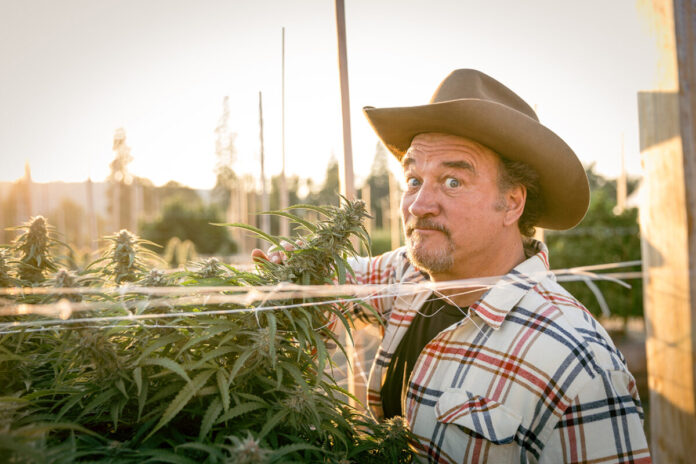NEW YORK – Actor, comedian, musician, and cannabis farmer Jim Belushi will be featured in upcoming Discovery Channel series “Growing Belushi.” The series will feature Belushi’s south Oregon cannabis farm, along with the people who live and work there.
Live Nation Productions and Original Productions will produce the series, which premieres on Discovery Channel, on Wednesday, August 19, at 10pm ET/PT. Viewers can stream the show by downloading the Discovery GO app, and join the conversation on social media by using hashtag #GrowingBelushi.
Having built the farm from the ground up, Belushi has become a vocal advocate for the healing benefits of cannabis, while building a successful cannabis business and brand. MgRetailer spoke with Belushi in January 2019, about his growing endeavors and life on the farm.
We spoke with him again about the new show.
mg: Is it fun to be a cannabis farmer? Do you like it better than other things you’ve done? Do we get to see examples of that on the show?
Jim Belushi: I chase fun. I try to find fun. And if there’s no fun, I make fun. That’s the joy of life and that’s the joy of an actor. You can create. Cannabis farming is fun, but it has tremendous challenges. And it’s fun to overcome those challenges.
Fun? Last year I took my cousin and my friend James Orr to Colombia. I was invited to speak at the Cartagena Cannabis Convention, so we went down early and spent nine days traveling from Bogota to Medellin to Cartagena—up in the mountains, on helicopters, searching for the Santa Marta Gold. I hired a camera crew down there, improvised and filmed everything. We got twenty-nine hours of footage.
Fun? Wow. That experience took us through a huge public smoke-out in the center of Medellin, where there were 150,000 people smoking. We filmed it all. And it’s in “Growing Belushi.” We found the seeds, lost the seeds, and found the seeds. That really happened, and that’s also in “Growing Belushi.”
The real fun has been mixing my acting hat, my producer hat, my writer hat, and my cannabis cultivation hat, all under one. Yeah, I’m having fun. I’ve been having fun ever since I hit the stage, sophomore year of high school. It’s really hard to compare what I’m doing with Belushi’s Farm and “Growing Belushi,” with all the movies and TV I’ve done. They’re like children. You put your heart into them. Every one of these projects has a piece of my heart and joy.”
mg: What do you think people will find most interesting about the show?
JB: I don’t think anyone has ever seen a show like this. It’s so multi-layered. It’s called “Growing Belushi,” not “Growing Pot.” There are so many things going on in this show.
There’s the actual agriculture of growing cannabis: the soil, the water, the sun, the feeding, the pruning, the harvesting, the trimming, the packaging, the selling, the camaraderie with people within our industry and their generosity of spirit.
There’s also the business aspect of how tough it is to do legal cannabis with the 280E tax law crunching the margins of these dispensaries and producers.
It’s also about family, and how the family needs to support each other for success. It’s also about my personal growth, riding alongside this beautiful and spiritual plant. I have discovered new relationships—new relationships within the business, reinvented relationships within my family, and a new relationship with myself. It’s also damn funny!
My cousin Chris, who has never been on camera before, is hysterical in this. He’s so dry and loving. He was just being himself. He didn’t know what else to do. It’s really charming and funny. So the show has everything in it. Personal growth, marijuana, The Blues Brothers, my family, insights into the medicine, insights into the joy.
I just think it’s really good. I hope everybody watches it and we get a second season where we can explore our industry even further and teach the people outside our industry that this is a legitimate, safe, joyful, and healing world that we all work in.
mg: How was it doing this project with Discovery Channel?
JB: I had done a reality show about the building of my house in Oregon called “Building Belushi.”
“Growing Belushi” is different because this one is my show. I produced it; I found the money with Michael Rapino at Live Nation, who is a hero. I found the production company. So, it’s nice to be the driving force.
Of course that brings along anxiety, fear, and doubt, but what the hell? Don’t we all live with that? I take a little hit off my Cherry Pie, “The Marriage Counselor,” and I chill out. This was a long project. We are coming up on three years since the first time we started rolling a camera.
We put together a sizzle reel and brought on Original Productions, then redid the sizzle reel. We pitched it to many outlets. I was surprised at how much they loved the idea of the show, but were scared about being able to find advertisers because of marijuana being federally illegal and everybody holding a federal license. But, Discovery took the risk. They believed in the messaging, the humor, and that this is the right time for a show like this.
And I will always be in a state of gratitude for Michael Rapino at Live Nation for financing it and for taking the risk, and Discovery for believing in me, the project, and taking their risk.
I’ve run into good people since I’ve been following this cannabis plant. These are exciting times for Belushi’s Farm. Select is making our Captain Jack vape pen in Oregon, which will be released in September. Grassroots is releasing the Blues Brothers brand exclusively, in its brand new 16,000 square foot dispensary in Skokie, Illinois, in the beginning of September. I’m signing deals in Colorado, Oklahoma, and Canada. Great things are happening.
But my heart falls with the Last Prisoner Project. Steve DeAngelo engaged me in this beautiful project. There are over 40,000 cannabis prisoners in the United States alone, for years—even decades—incarcerated for doing something that is no longer a crime in many states, while thousands of us are profiting legally off the same plant that got them incarcerated.
Michael Thompson has been in jail for twenty-five years, in Michigan, serving a 40-year sentence for having three pounds of marijuana. It destroyed his family. And now sadly, he has contracted COVID-19 and is in the prison hospital at 65 years old. Communities of color are subject to disproportionate marijuana enforcement practices.
Along with Steve DeAngelo, I’m doing my best to raise awareness and funds to release these individuals with clemency, help them with reentry, and get them out of the COVID-19 fear that penetrates these prisons. Text FREEDOM to 24365 to donate to the Last Prisoner Project. Please, help if you can.













